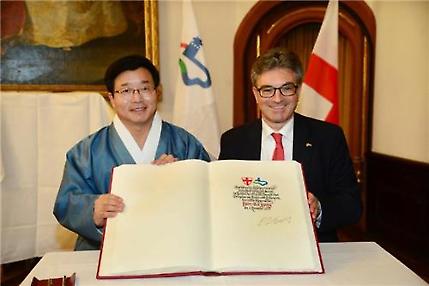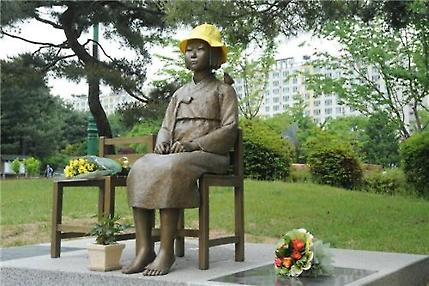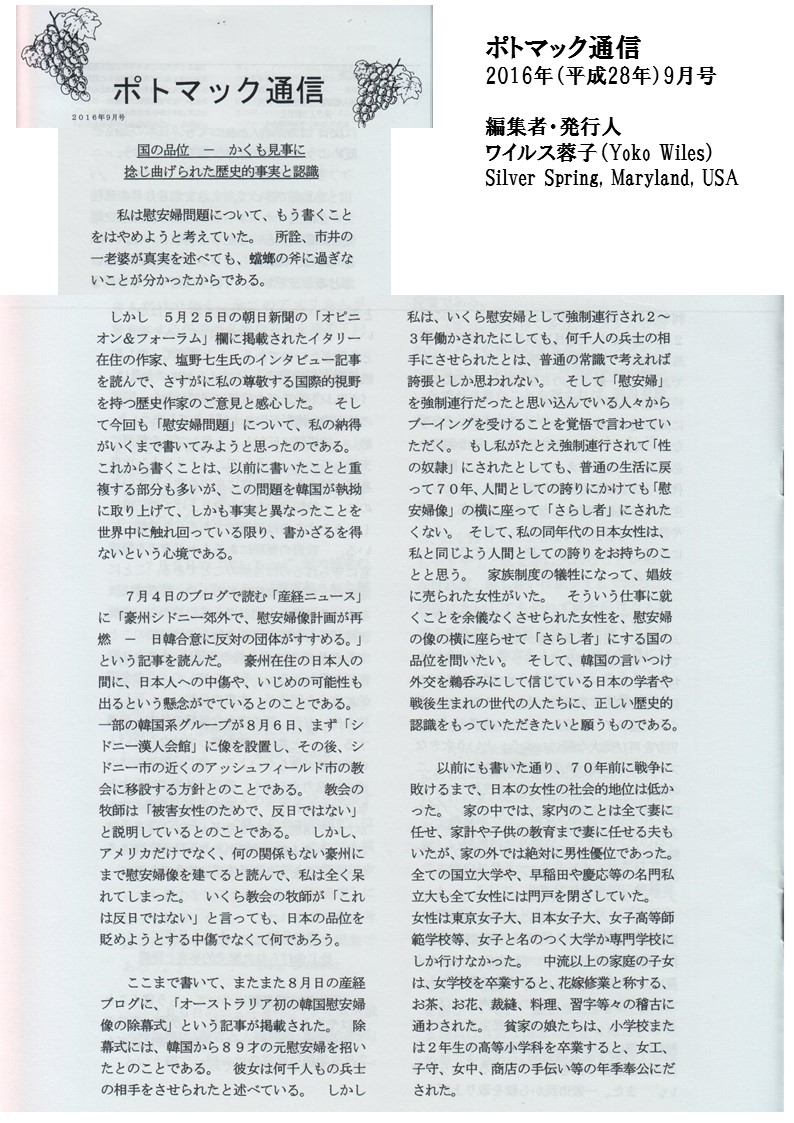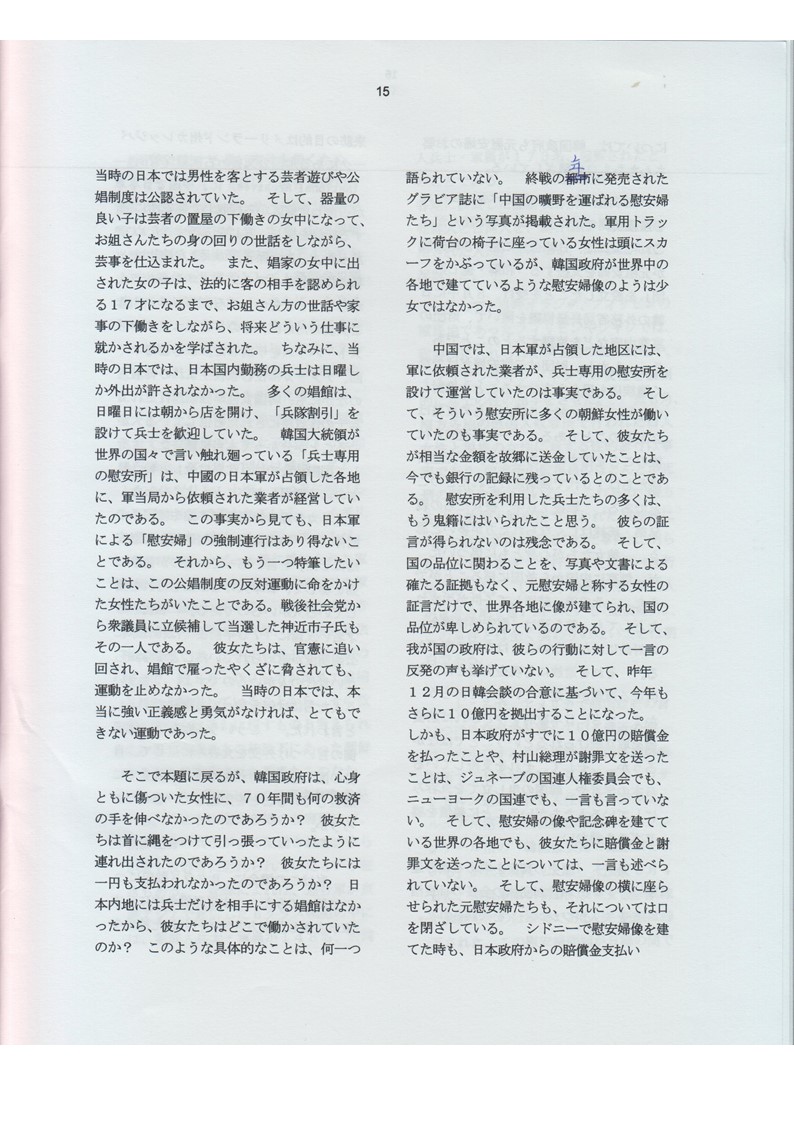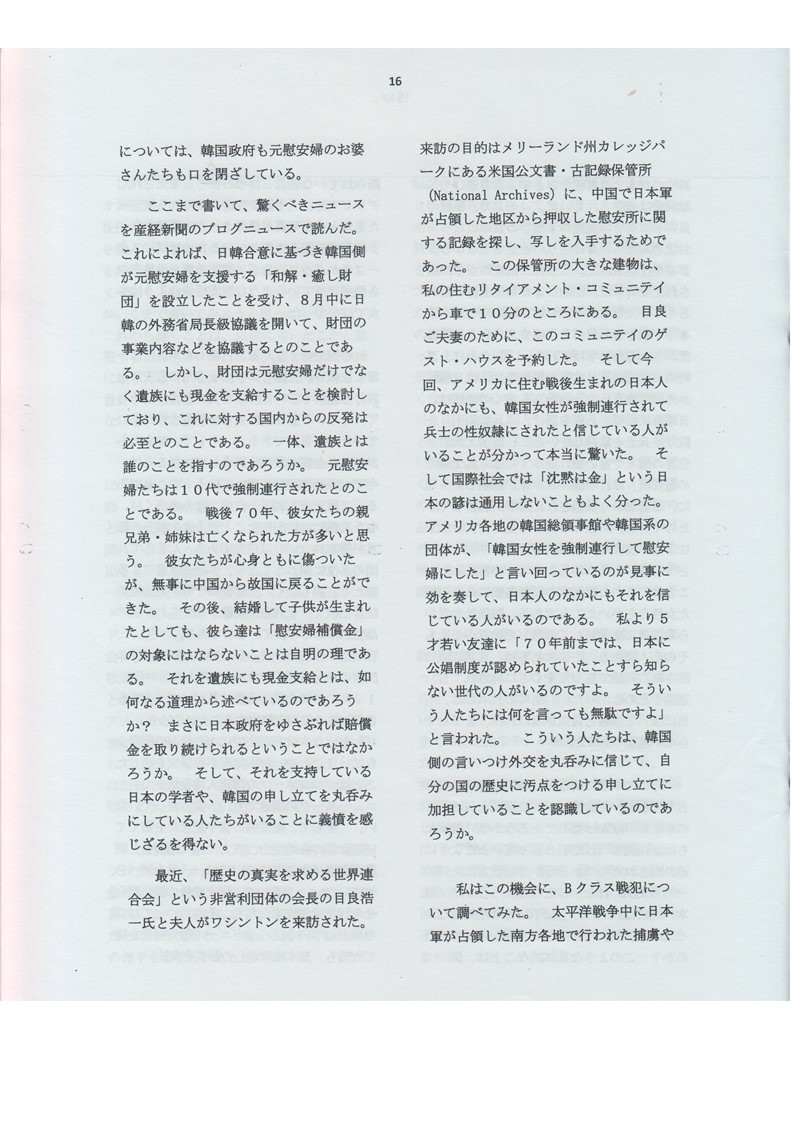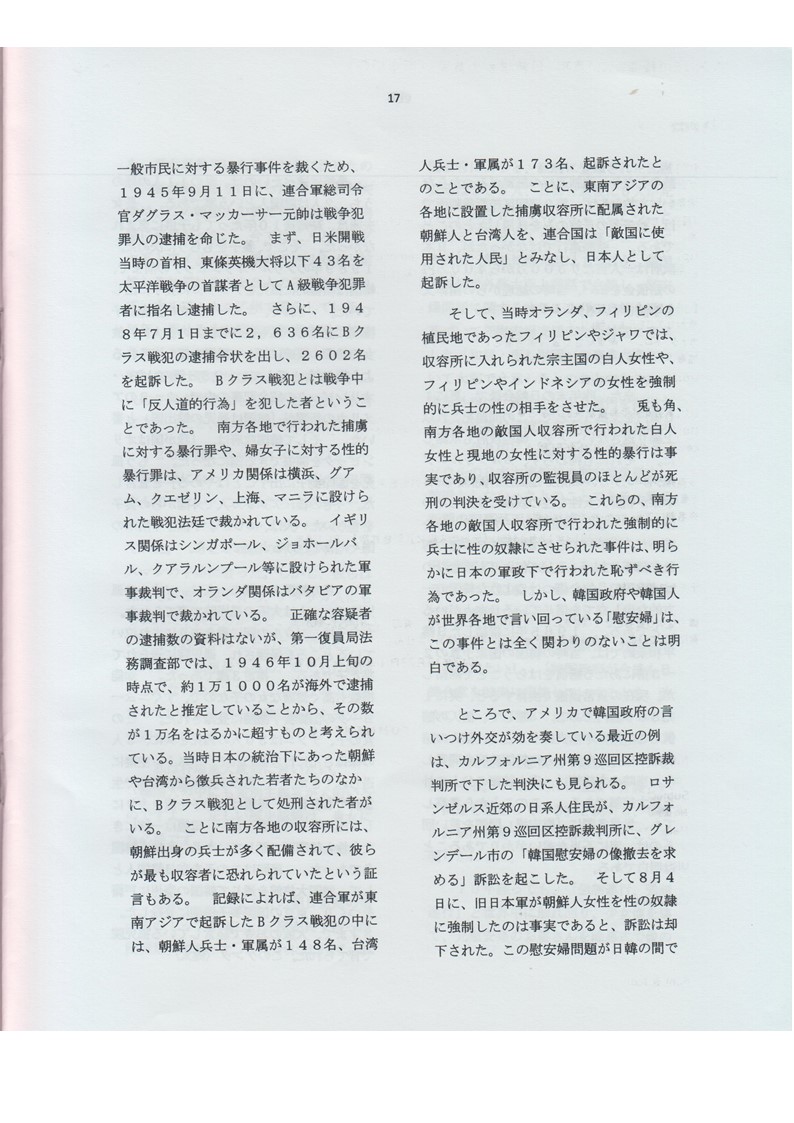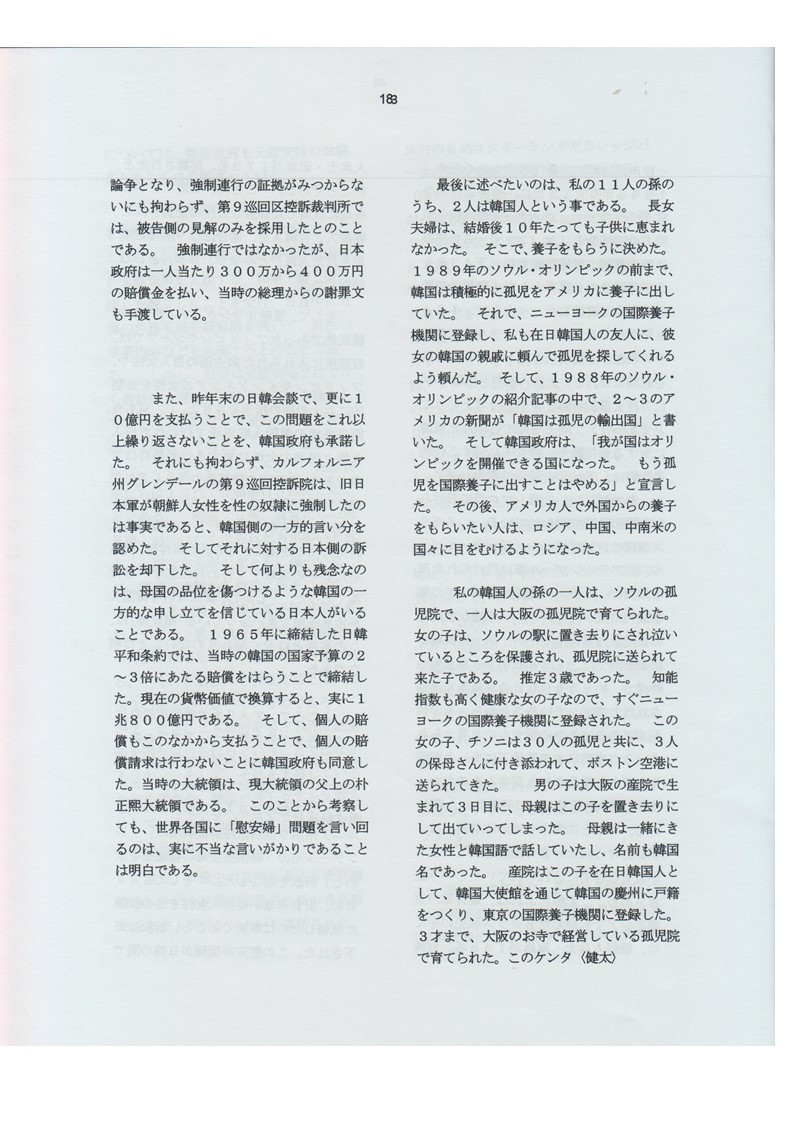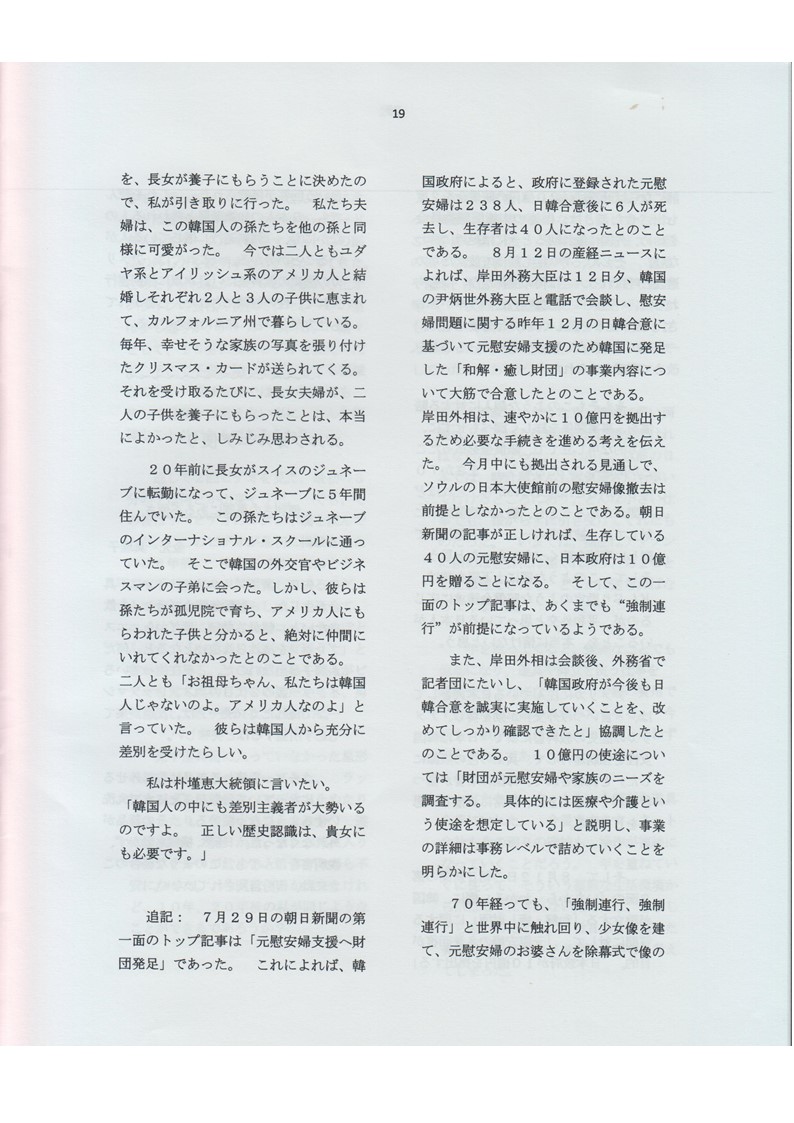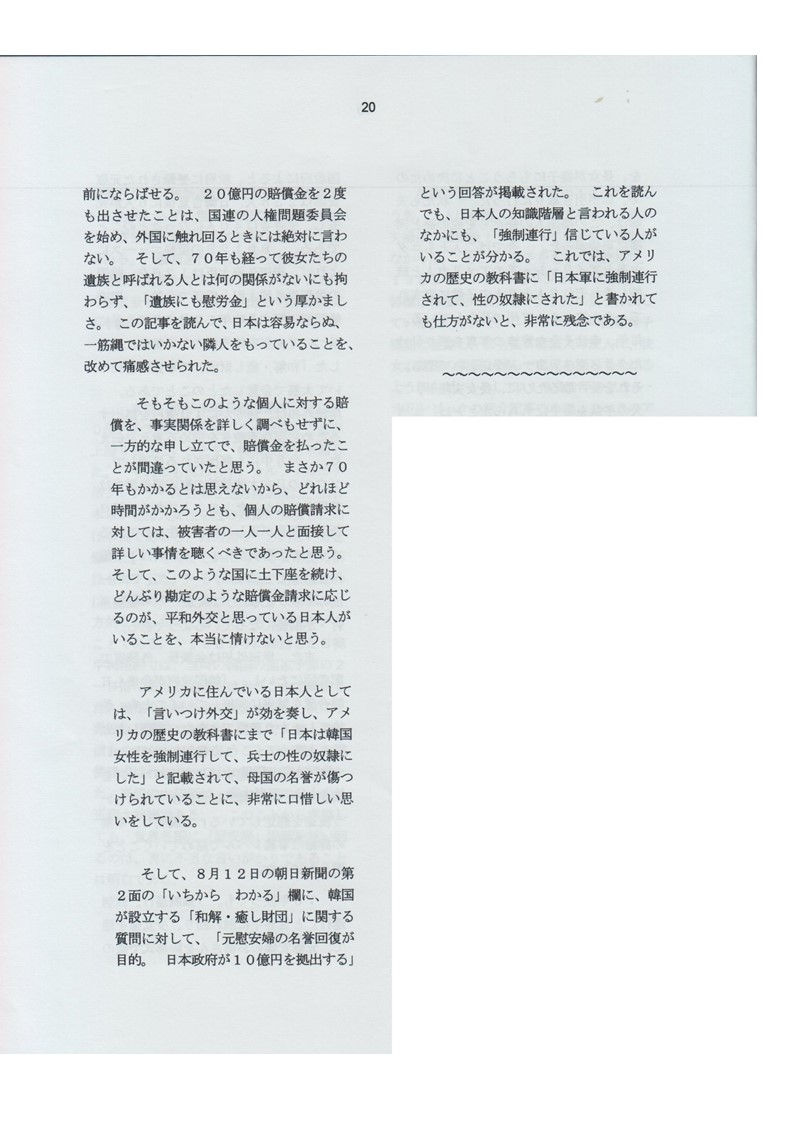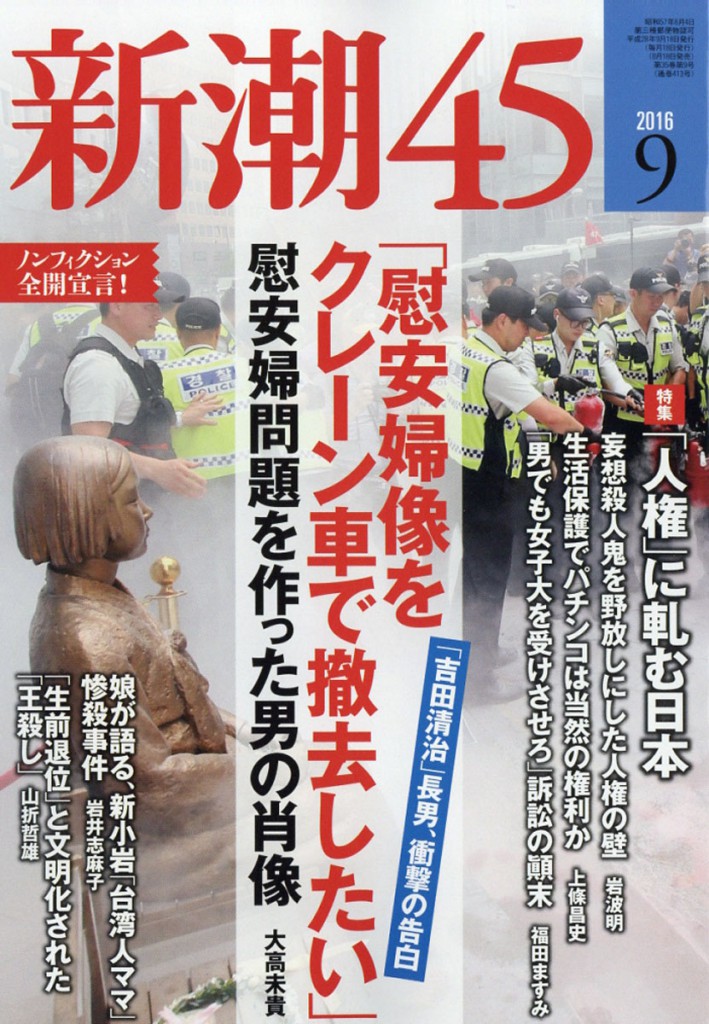ドイツ南西部、環境都市としても有名な美しいフライブルク市。報道によると、2015年に姉妹都市となった韓国の水原(スウォン)市の提案で今年(2016年)12月10日世界人権宣言記念日に合わせて慰安婦少女像が設置される予定です。
このままでは、人権記念日が日本人への人権侵害記念日になりかねません。
2015年末の「慰安婦問題は最終的に不可逆的に解決した」という日韓合意に反発して、韓国系団体や韓国の自治体による像設置運動が韓国内外で盛んになってきました。
像や碑は一度設置されたら撤去するのは非常に困難になります。
反対の声を挙げるなら今!です。
現時点(2016年9月13日)ではまだ情報が少ないので、以下にわかる範囲でまとめました。
追加情報ありましたら追記していきます。
※2016年9月現在、韓国以外の「慰安婦=性奴隷」像と碑
像は、公共の場所では、米国カルフォルニア州グレンデールに一体のみ。
カナダ・トロント(韓人館内)、米国ミシガン・サウスフィールド(韓人館内)、豪州シドニー(教会)の像は全て私有地内。
記念碑は米国内の公有地7基(NYアイゼンハワー公園3つ、NJハッケンサック、NJパリセイズパーク、NJユニオンシティ、VAフェアファックス)、私有地1基(CAガーデングローブ)。
これらの像・碑には「慰安婦は日本軍の性奴隷」「人身売買被害者」「20万人の女性・少女が強制連行された」「日本の人類に対する犯罪を記憶する」などと刻まれています。
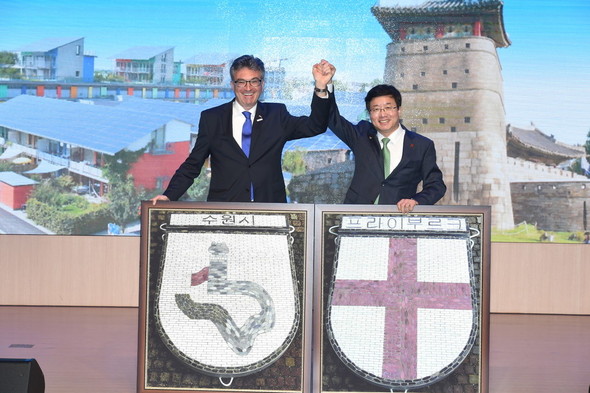
昨年11月4日、姉妹都市協定締結のために水原市を訪問したドイツ・フライブルク市のディーター・ザロモン市長(左)とヨム・テヨン水原市長。二人は最近、フライブルク市の中心部に平和の少女像を建立することに合意した=水原市提供//ハンギョレ新聞社
*************************************************************
<フライブルク市>
フライブルク市 freiburg市 公式サイト
http://www.freiburg.de/pb/,Lde/205243.html
フライブルク市長ディーター ザロモン Oberbürgermeister Dr. Dieter Salomon
http://www.freiburg.de/pb/,Lde/205852.html
市長への問い合わせフォーム E-Mail Formuler
http://www.freiburg.de/pb/,Lde/205868.html
フライブルク市の国際交流事業チーム Leitung des Referats Internationale Kontakte
http://www.freiburg.de/pb/,Lde/208937.html
代表 ギュンター ブルガー Günter Burger
Mail: Guenter.Burger@stadt.freiburg.de
*************************************************************
<フライブルク市 市長 市議 >
※Frau は女性の敬称。
Herrは男性の敬称。手紙に書くときのみHerrnを使う
市長
Herrn Oberbuergermeister Dr. Dieter Salomon
Rathausplatz 2-4
79098 Freiburg
Germany
市議会議員
与党 緑の党
1)Frau Stadtraetin Pia Federer
メール pia.federer@gruene-freiburg.de
住所 Carl-von-Ossietzky-Str. 7
79111 Freiburg
Germany
2) Herrn Stadtrat Gerhard Frey
メール gerhard.frey@gruene-freiburg.de
住所 Sternwaldstr.. 28
79102 Freiburg
Germany
3) Herrn Stadtrat Eckart Friebis
メール eckart.friebis@gruene-freiburg.de
住所 ℅ Fraktion B90/DIE GRUENEN
Rehlingstr. 16a
79115 Freiburg
Germany
4) Frau Stadtraetin Maria Hehn
メール maria.hehn@gruene-freiburg.de
住所 Rosenau 5
79104 Freiburg
Germany
5) Frau Stadtraetin Nadyne Saint-Cast
メール nadyne.saint-cast@gruene-freiburg.de
住所 Jaegerstr. 21
79108 Freiburg
Germany
6) Herrn Stadtrat Ibrahim Sarialtin
メール ibrahim.sarialtin@gruene-freiburg.de
住所 Hansjakobstr. 154
79117 Freiburg
Germany
7) Herrn Stadtrat Timothy Simms
メール timothy.simms@gruene-freiburg.de
住所 Wiesentalstr. 52
79115 Freiburg
Germany
8) Herrn Stadtrat Helmut Thoma
メール helmut.thoma@gruene-freiburg.de
住所 ℅ Fraktion B90/DIE GRUENEN
Rehlingstr. 16a
79115 Freiburg
Germany
9) Herrn Stadtrat David Vaulont
メール david.vaulont@gruene-freiburg.de
住所 Scheffelstr. 37
79102 Freiburg
Germany
10) Frau Stadtraetin Maria Viethen
メール maria.viethen@gruene-freiburg.de
住所 Oberau 59
79102 Freiburg
Germany
11) Frau Stadtraetin Birgit Woelki
メール birgit.woelki@gruene-freiburg.de
住所 Scheffelstr. 48
79102 Freiburg
Germany
野党 ドイツキリスト教民主同盟 (CDU)
1)Herrn Stadtrat Hermann Aichele
メール aichele@cdu-fraktion-freiburg.de
住所 Naegeleseestr. 34
79102 Freiburg
Germany
2) Herrn Stadtrat Berthold Bock
メール bock@cdu-fraktion-freiburg.de
住所 Hochfirststr. 24
79115 Freiburg
Germany
3) Herrn Stadtrat Wendelin Graf von Kageneck
メール von.kageneck@cdu-fraktion-freiburg.de
住所 Schlossbuck 9
79112 Freiburg
Germany
4)Herrn Stadtrat Udo Harter
メール harter@cdu-fraktion-freiburg.de
住所 Hutweg 26
79110 Freiburg
Germany
5) Frau Stadtraetin Carolin Jenkner
メール jenkner@cdu-fraktion-freiburg.de
住所 Eschholzstr. 84
79115 Freiburg
Germany
6) Herrn Stadtrat Martin Kotterer
メール kotterer@cdu-fraktion-freiburg.de
住所 Hoellentalstr. 74
79117 Freiburg
Germany
7) Frau Stadtraetin Syvie Nantcha
メール dr.nantcha@cdu-fraktion-freiburg.de
住所 ℅ CDU-Fraktion
Rathausplatz 2-4
79098 Freiburg
Germany
8) Herrn Stadtrat Bernhard Schaetzle
メール schaetzle@cdu-fraktion-freiburg.de
住所 Breisguerstr. 52
79110 Freiburg
Germany
9) Herrn Stadtrat Klaus Schuele
Hoellentalstr. 66
79117 Freiburg
Germany
野党 ドイツ社会民主党 (SPD)
1) Frau Stadtraetin Renate Buchen
メール Renate.Buchen@t-online.de
住所 Baldensteinstr. 5
79111 Freiburg
Germany
2) Frau Stadtraetin Tuerkan Karakurt
Immentalstr. 36
79104 Freiburg
Germany
3) Herrn Stadtrat Walter Kroegner
メール tuerkan.karakurt@gmx.de
住所 Schlesierstr. 4
79117 Freiburg
Germany
4) Herrn Stadtrat Ernst Lavori
メール e.lavori@gmx.de
住所 Am Rotschachen 29
79110 Freiburg
Germany
5) Frau Stadtraetin Margot Queitsch
メール margot-queitsch@web.de
住所 Freiligrathstr. 68
79115 Freiburg
Germany
6) Herrn Stadtrat Stefan Schillinger
メール info@stefan-schillinger.de
住所 Hauriweg 21
79110 Freiburg
Germany
7) Frau Stadtraetin Karin Seebacher
メール karin.seebacher@web.de
住所 Markgrafenstr. 77
79115 Freiburg
Germany
8) Frau Stadtraetin Julia Sophie Soehne
メール j.soehne@gmail.com
住所 Egonstr. 6
79106 Freiburg
Germany
独立 議員(Unabhängige Listen)
1) Herrn Stadtrat Erguen Bulut
2015年11月ご逝去
2) Herrn Stadtrat Atai Keller
メール ataikeller@t-online.de
住所 Jakob-Burckhardt-Str. 3
79098 Freiburg
Germany
3) Herrn Stadtrat Michael Moos
メール moos@anwaltsbuero-im-hegarhaus.de
住所 ℅ Fraktionsgemeinschaft Unabhaengige Listen
Rathausplatz 2-4
79098 Freiburg
Germany
4) Frau Stadtraetin Ulrike Schubert
メール ulmischubert@gmx.de
住所 ℅ Fraktionsgemeinschaft Unabhaengige Listen
Rathausplatz 2-4
79098 Freiburg
Germany
5) Herrn Stadtrat Lothar Schuchmann
メール lothar.schuchmann@linke-liste-freiburg.de
住所 Schwimmbadstr. 24
79100 Freiburg
Germany
6) Frau Stadtraetin Irene Vogel
メール irene.vogel@yahoo.de
住所 Schwarzwaldstr. 2
79102 Freiburg
Germany
7) Frau Stadtraetin Brigitte von Savigny
Erwinstr. 107
79102 Freiburg
Germany
その他の野党
1) Herrn Stadtrat Coinneach McCabe
メール coinneach.mccabe@gmail.com
住所 Guntramstr. 1
79106 Freiburg
Germany
2) Herrn Stadtrat Lukas Moerchen
メール lukas@moerchen.fr
住所 Ingeborg-Drewitz-Allee 45
79111 Freiburg
Germany
3) Herrn Stadtrat Karl-Heinz Krawczyk
メール info@dach-ok.de
住所 Burkheimerstr. 6
79111 Freiburg
Germany
4) Herrn Stadtrat Klaus-Dieter Rueckauer
メール klaus-dieter.rueckauer@fuer-freiburg.org
住所 Kirchstr. 39
79100 Freiburg
Germany
5) Frau Stadtraetin Gerlinde Schrempp
メール gerlinde.schrempp@gmx.de
住所 Bussardweg 79
79100 Freiburg
Germany
6) Herrn Stadtrat Wolf-Dieter Winkler
メール winkler-freiburg@t-online.de
住所 Stadtstr. 56
79104 Freiburg
Germany
7) Frau Stadtraetin Anke Dallmann
メール anke_dallmann@web.de
メール anke.dallmann@stadt.freiburg.de
Bertha-von-Suttner-Str. 14
79111 Freiburg
Germany
8) Herrn Stadtrat Johannes Groeger
メール fraktion@freie-waehler-freiburg.de
住所 Sonnhalde 79
79104 Freiburg
Germany
9) Herrn Stadtrat Manfred Stather
メール manfred.stather@stadt.freiburg.de
住所 Guenterstalstr. 24
79100 Freiburg
Germany
FDP
10) Herrn Stadtrat Patrick Evers
住所 Marienstr. 2
79098 Freiburg
Germany
11) Herrn Stadtrat Nikolaus von Gayling-Westphal
住所 Schwarzwaldstr. 278
7911 Freiburg
Germany
*******************************************************************************
<現地メディア>
1) Badische Zeitung
Z. H. v. Herrn Chefredakteur Thomas Hauser
Loerracherstr. 3
79115 Freiburg
Germany
2) Sueddeutsche Zeitung GmbH
Z. H. v. Herrn Chefredakteur Kurt Kister
Hultschinerstr. 8
81677 Muenchen
Germany
3) Zeitung am Samstag Verlags GmbH(14日毎発刊)
Z. H. v. Herrn Chefredakteur Michael Zaeh
Benzstr. 22
79232 March-Hugstetten
Germany
4)日本語フリーペーパー月刊ニュースダイジェスト
問い合わせ info@newsdigest.de
*******************************************************************************
<外務省>
在ドイツ日本国大使館及び総領事館一覧表
http://www.de.emb-japan.go.jp/nihongo/konsular/liste.html
*************************************************************
<姉妹都市 関連>
愛媛県松山市公式サイト 姉妹都市 フライブルク市
https://www.city.matsuyama.ehime.jp/kids/outline/shimai/freiburg.html
韓国 水原市 公式サイト
http://www.suwon.go.kr/index.jsp
旭川市 姉妹都市・大韓民国 水原市
http://www.city.asahikawa.hokkaido.jp/kurashi/408/437/438/suwon.html
福井市 姉妹都市 水原市
http://www.city.fukui.lg.jp/sisei/fukuisi/simaitosi/p001423.html
*************************************************************
<ニュース>
産経ニュースweb版 2016.9.20
【山本優美子のなでしこアクション(6)】
ドイツに慰安婦像建立が計画されています…「世界人権デーに日本人の人権が侵害されるなんて!」
愛媛新聞 2016年09月17日(土)
独フライブルクに慰安婦像計画 松山市、中止要請へ
産経ニュース2016.9.16 05:00
【歴史戦】ドイツの慰安婦像計画、松山市が懸念伝達 姉妹都市交流に影響も
KYODO SEP 8, 2016
Europe’s first ‘comfort women’ statue planned for German city
福井新聞 2016年9月8日
福井市長の韓国水原市訪問中止も 独への慰安婦像設置報道で真意確認へ
産経 2016.9.7 18:54
【歴史戦】慰安婦像、今度は独フライブルク市に年内設置へ、欧州で初 姉妹都市・韓国水原市長が働きかけ
中央日報/中央日報日本語版 2016年09月06日
慰安婦少女像、欧州で初めてドイツに設置
ハンギョレ新聞 2016.09.05
「平和の少女像」、ドイツのフライブルク市に建立される
Yonhap News 2016/09/05
Statue symbolizing former sex slaves to be erected in Germany: Suwon mayor
The Korea Times 2016-09-05
First comfort women statue to be erected in Europe
The hankyoreh Sep.5,2016
[Photo] Comfort woman statue to be erected in Europe for first time
聯合ニュース 2016.9.5
유럽에도 ‘평화의 소녀상’..獨 프라이부르크시에 건립
ヨーロッパでも「平和の少女像」。獨フライブルク市に建設
*************************************************************
『衝撃!!ドイツ慰安婦像の闇に迫る!!①』
藤井実彦 AJER2016.9.21(9)
https://www.youtube.com/watch?v=ntgJIyuRPPI

